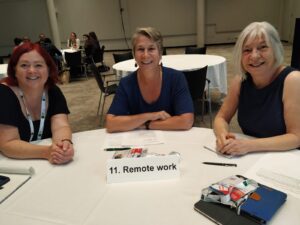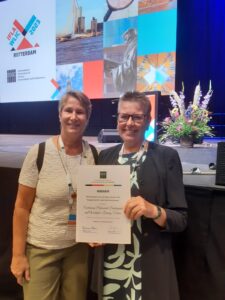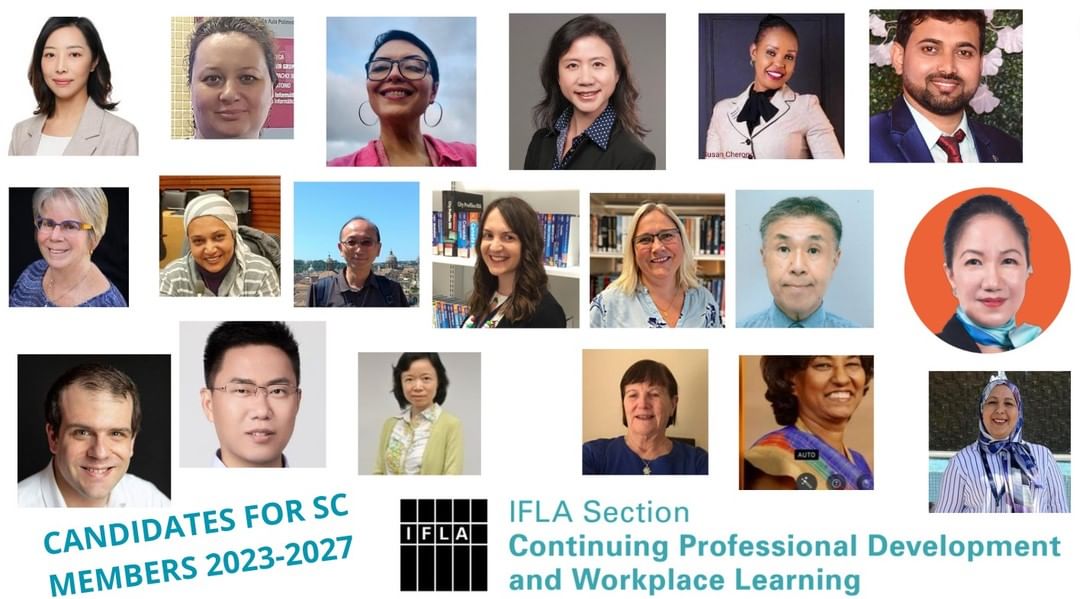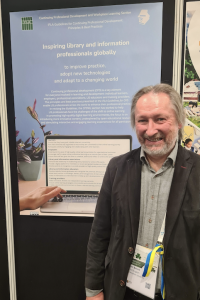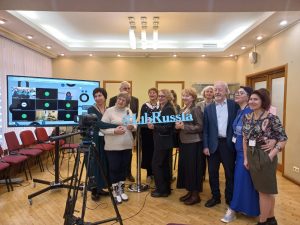Colleagues, we are excited to announce the our next episode (for season 3) of the CPDWL Podcast Project where we feature library and information professionals who support and participate in professional development work.
See here for the podcast: https://spotifyanchor-web.app.link/e/gJeRJVcz2xb
Our guests are Spencer Acadia and Fran Holyoke. The topic is on toxic libraries.
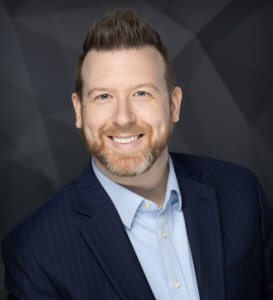
Spencer Acadia holds a PhD in sociology, an MA in psychology, and an MLS. Spencer is an assistant professor in the Research Methods and Information Science department at the University of Denver in Denver, Colorado. Spencer teaches social science research methods to library school students, as well as courses in library management, collection development, and international library research and practice. A part of Spencer’s ongoing research investigates LIS dysfunction, including library workplaces, education, and the profession. Prior to becoming a full-time professor, Spencer worked in academic libraries for over ten years. Find Spencer online at https://spenceracadia.com and via Twitter at @s_acadia.
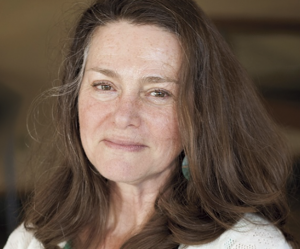
Francesca Holyoke is now retired from a 30 plus years career in principally, academic libraries and archives. In addition to government and public libraries, Francesca has worked in nearly every library department including cataloguing and reference, she has done consulting and delivered children’s services, ranging from a library assistant to a branch and department head in both the Sciences and the Arts. Throughout her academic career she was heavily involved with the local faculty association and the national organization the Canadian Association of University Teachers. She continues some of her union work along with archival appraisals.
Transcript Below:
Ray: Hi, this is Raymond Pun, a standing committee member of IFLA CPDWL Section. Welcome to the IFLA CPDWL Podcast Project. In this space, we talk with library and information professionals who support and participate in professional development work. Today’s guests are Dr. Spencer Acadia, chair of the Knowledge Management Section and Francesca Holyoke, a now retired librarian/archivist at the University of New Brunswick and former faculty association president and grievance officer. We’ll be talking about toxic and dysfunctional libraries and what that means for library workers. Welcome Spencer and Fran.
Fran: Thank you.
Spencer: Thank you. It’s good to be here.
Ray: Now we’re really excited to have you both here to talk about this one topic. And first, let’s define what a toxic or dysfunctional workplaces so according to what I’ve seen on the websites, many, many websites trying to define this these terms it is an any work environment where the people and or work itself can create dysfunction or violation to your well being, particularly your health. And I want to ask by starting with you, Fran, is there anything else you’d like to add to that definition?
Fran: I’m assuming that when you say particularly your health that you’re encompassing mental, physical and spiritual health in the broadest possible terms.
Ray: Yeah, that’s correct. Yeah. That’s a holistic consideration of different types of health and sensor. Anything else you want to add?
Spencer: Sure, I think there’s a few points that could be added here. I would say first that I don’t. I do think it’s important to make clear that it doesn’t necessarily have to be health related. For example, if you are unhappy at your job or dissatisfied with the work that you’re doing, that dissatisfaction and unhappiness can still happen without it necessarily being detrimental to your health. I also think it’s important to say that dysfunction in a library can happen to without any direct effect on you at all. And an example of that might be something like corruption that’s happening in administration. Right? It’s something that’s happening sort of secretly something that you have no idea is going on, but yet is still dysfunctional is still maybe impacting the organization but not necessarily you directly. And then lastly, on this point, I’ll say that it’s that I think it’s important to recognize that it’s not just the people at work, right, your co workers that you work with, or necessarily the work itself, but also the larger workplace, right? It literally that environment that you’re working in, or the organization. And the reason I think that this is important to mention, is because there’s a lot of emphasis, Ray. And you know this because you’ve looked at some of the literature’s and the websites, there’s a lot of emphasis on the individual. Right, and that emphasis on an individual is what is common, less so though the systems within which they work. And so I just think it’s also important to recognize that, yes, there is an individual component to the definition, but for me, I think it’s also important to recognize sort of the larger social and organizational component as well.
Ray: Yeah, thank you, Spencer, for that context there. Very true that it could be a violation of one’s ethics values and norms, not necessarily, like directly impacting health, but also looking at it from you shared about individual and system. So we’re going to get into that. And so, you know, pivoting to this other question that we have here for you, it’s about your new book, Spencer, “libraries as dysfunctional organizations and workplaces.” So congratulations on having this new book out.
Spencer: Well, thank you that will be coming up very shortly.
Ray: Yeah. And in this new book, authors from the United States and Canada discuss workplace dysfunction in North American Library contexts, and you put here quote, “the new book seeks to expand the geography of dysfunction related to Library Information Sciences and libraries. The editor seek proposals which chapters will events discourse on assumption libraries, as well as workplaces and within LIS as a discipline and profession for European and Australian libraries. Every context proposals concerning the New Zealand libraries will be considered.” So how did you come up with this book and you have highlights from what you want to share?
Spencer: Sure, there’s a few things that I can say about this. So first, into that description that you’d mentioned, just in the there’s actually two separate projects going on there. So there is the book that you mentioned, that’s titled, “Libraries has dysfunctional organizations and workplaces.” That’s the book that will be coming out. Very shortly. It’s being published by Routledge. And that book focuses on US and Canada. All the authors are from the United States and Canada, and they’re all talking about US and Canadian context. The other project though, going on is the follow up book, and that’s where the European and Australian context come into play. I’m looking to put together a follow up book to this book that’s about to come out. That sort of takes the very similar conversations happening in North America on this topic, and looking to see what our European colleagues and our Australian colleagues are experiencing or not as the case may be, but with the book that is about to come out. I will say a few things about that. So the idea for that book, first came from my own experiences working in academic libraries. I worked in academic libraries for a little over 10 years. And I worked in several different libraries, and they were all I found them to be dysfunctional in their own ways. They all had all these different libraries. There were issues that were problems, some similar, some different, but because I saw these several different libraries that I worked at, right, so all of the real life and practical library experience I had was working in libraries that were problematic that were dysfunctional. And so that led me to think that perhaps there was something wrong with me, right that, I somehow was the problem. I was the issue. I was really internalizing this. But secondly, I later became aware of various social media accounts, blogs, articles and so on, from folks across North America that seemingly we’re experiencing the same things. And so with these two things combined, I began realizing, well, it isn’t just me, the problem is lying within me, because it can’t be if there are folks all around the countries in the US and Canada who are also expressing some of these very same things and so on where the book came along, was first, like I just mentioned, I mentioned social media accounts. There was one particular social media account, LIS grievances. It’s a Twitter account, that you may or may not be familiar with, but it was started by Tim Ribaric at Brock University in Ontario. And that Twitter account, sort of was was really instrumental in this recognition that, that I wasn’t alone in experiencing these issues. And then also in 2017, there was a book that was published called “The Dysfunctional library.” And it was a book by Jo Henry and colleagues, and ala published it, and that was published at the end of 2017. I was really quite amazed that he published that book, by the way that ALA would want to publish, you know, a title that recognized that, “hey, libraries are dysfunctional, and there’s problems that we’re having in libraries, but they did.” And so following those inspirations, I conceive of this book as a way really to begin asserting that there needs that there are indeed shared experiences here. And that is a really important point. And it’s important through this book, and through the work of others that we recognize the dysfunction that is happening in libraries, we recognize that it’s there and we acknowledge that it’s there. And then through recognizing it and acknowledging that we can subsequently begin to address it. And the last thing I’ll say here, we’re going to highlights that you mentioned is really so there’s 14 chapters in this book. The book has a website, you can Google the title, maybe, Ray you can provide the link, maybe somewhere on the website. or whatnot. But you can Google the title, find the website and look at the table of contents. There’s 14 total chapters. I do want to say that one of the authors of the chapter of a chapter in the book is actually Tim Ribaric, who created the LIS grievances Twitter that I just mentioned, he contributed a chapter talking about the LIS grievances account. I also co authored a chapter in the book with a colleague in Montreal, and we were looking at memes as a way through which library users or excuse me, library workers experiencing dysfunction are able to express that dysfunction. And so we analyze the memes and that really turned out to be a really interesting study. And then lastly, I’ll say I did write an introduction to the book not just to set up the chapters, but also and this is the really important part for me. The purpose of that introductory chapter is to also pick apart the problems with viewing library dysfunction only as an individual problem. And I really argue the point that it’s important to look at the library dysfunction phenomenon as one that’s also social and organizational.
Ray: Yeah, it’s really interesting that you mentioned that earliest grievances on Twitter Yeah, I am familiar with it. And for those listening who are not familiar with it, is a program where you where users can submit anonymous comments and then it would generate generated push it out to the followers and anyone who’s looking at the issues that people experiencing and share anonymously. And so it definitely will dive into more. Some of the points that you’re sharing there, Spencer, it’s very fascinating to hear I’ve already thinking about, especially when you’re talking about like, initially not fitting in or feeling like there’s all these problems coming and I think there’s this this notion that I hear a lot of other folks have shared with me over the years. It’s like the self gaslighting thinking, “oh my gosh, it’s something maybe wrong with me. I’m not getting it” but actually there’s something really problematic with the systems and it’s sort of rolling over time. And with that being said, I wanted to also ask you here, so I connected with Fran through Jeanne Bail, who is an IFLA section member of the management and marketing section connected us and I really wanted to highlight or get Fran’s take on some of these issues and topics. And so from your experiences, what are your thoughts about toxic and dysfunctional libraries as well as what Spencer had shared?
Fran: Sure, thank you and I think, perhaps start with something that that Spencer has shared and first is that I have worked with Tim Ribaric. And in fact, he became the chair of a committee that I chair at one point, which is the Canadian Association of University teachers, librarians and archivists committee, and it is certainly a forum whereby you hear a lot of what’s going on in academic libraries. And like Spencer, my work experience is largely from academic libraries. What may not have been said quite so explicitly is at least in the Canadian context, academic libraries are highly unionized because of the presence of Faculty Associations pretty well across the country. So with respect to the library work sector, the Canadian academic library is probably among the most highly unionized. That doesn’t mean that problems get resolved quickly or easily. But it’s just a fact to note. I will mention too, or refer back to Spencer’s comment about maybe you were the odd one out or you know, you felt maybe you weren’t seeing things properly. That certainly had been my experience. And among the first instances that I felt that I had been in a community of people that share concerns and perspectives about what was going on more provocative environment was the first time I went to a CAUT librarians conference. And then I heard people speaking the same language about how it is you might approach services or collections or outreach or all that sort of thing. And that’s only been been reinforced both through my years of continuing to work both in the library and the archives of the University Library, and simultaneously being involved with the Faculty Association. So that’ll kind of lace itself to my comments, and I find that being questioned at any point. I should mention, too, that I’ve also been aware of dysfunction in some federal library archives in institutions. And that’s certainly a point we could come back to later, in broad brushstrokes. They’re deeply damaging to the people working there, which is, I think, sadly ironic, given that libraries are the most part of public service organizations looking to help people provide support. And yet you hear as you do on the Twitter feed that you mentioned, I’ve certainly been aware of it through participation. In national bodies, and within my own faculty association, that there doesn’t seem to be the support for the people within. So part of it is that if only the consideration conveyed outwards, were the case looking in the experiences consulted demoralize people that those affected but will retrenched from work that in most cases they genuinely love and they will cease to care about doing their best. They might rightly choose to leave that environment. And that may be in part what either the bully or the system is in fact trying to do. One of the things that you hear happening frequently throughout libraries is all this reorganization and certainly there are times when it’s important, proper appropriate to reorganize, but how often is it a way of putting in place a mechanism that shoves people out the door as as as it were? These kinds of work sites, work environments, stifle the creativity of those that are in the organization and it potentially hampers what the organization can can do. And what it does is stop people from working together when they might otherwise be quite willing to do so. There’s a culture of fear there’s a cultural silencing, and people often won’t admit to one another until things have gone fairly well off the rails that something doesn’t seem right here. Again, as a broad statement, the toxicity seems in many cases to derive from up on upper and middle managers doing what they are instructed or believe they are instructed to do by the levels above them that their intent on a kind of a top down approach, without think taking to heart or remember that part of their job is to honestly represent and protect those who worked for or under them. That’s certainly an understanding that’s shared, I would say through a lot of academic libraries in Canada, is that some of that is is driven by corporatization where you are moving to have more business approach to things and the other can be elements of that that are appropriate. But in general, for public service. I think that that doesn’t work and with that, again, it’s a it’s a common refrain that neoliberalism has has accelerated those kinds of effects. Some broad brushstrokes that that would be my experience, and a final comment, is that having been a grievance officer, I’ve found that librarians are loath to grieve. They just don’t seem to want to take that step. Even though you can point to things that are arguably grievable or certainly problematic, they seldom want to take that final step.
Ray: So why is that? Why why do they sell them take that final step? Is it because they don’t want to critique their colleagues or criticize or is it something that is you know, like a personality driven approach?
Fran: I think it’s certainly both of those that they they don’t want to critique colleagues. They don’t want to appear to be tearing people down. You’re coming from a work environment where you work in many instances as a team and so to critique that to to bring forward problems with that. I think a lot of librarians and archivists are are concerned that that it will make their colleagues look bad. I think a bigger piece of it is a fear that they feel as if the odds are stacked against them. That people don’t quite know how to thread their way through that sort of thing. And tend to believe that that as Spencer was was mentioning earlier, that it’s that it’s their problem. And it’s something that they’ve done wrong. And so they question whether or not they’ve taken all the steps that they could take so that by the time they come forward with something, it’s become quite complicated and messy, and there’s often a fairly long timeframe that makes it difficult to pick through a grievance process because in most situations, whether you’re grieving formally under a collective agreement, or under some kind of general institutional policy, there are timeframes, time limits that that can impinge upon that process.
Ray: Oh, yeah, that is very true. And I’ve seen maybe were on social media graphics of the infographic kind of thing where people are compelled to read the complaint, like there’s nowhere to or no consequences.
Fran: Yup
Ray: So and with that being said, I, it runs up to this other question that we have, which is thinking about the strategies and advice that you can share with our listeners with you might be our listeners might be experiencing toxic or dysfunctional or business alignment. Right now. So what are some ways to mitigate or to really address it as they’re working on and can’t necessarily lead or find another position? Spencer?
Spencer: Thank you, right. So this is actually quite a difficult question to answer.
Fran: Agree
Spencer: And Fran agrees, yeah. So but I do think there’s a few things that can be said here. So first, I want to say that I am a big believer, I always have been in self care. Whatever that means for you, as an individual self care can mean a lot of different things for different people. But whatever it is that helps you get through the day, get through the week. Right? Whatever it is, that helps you make it through that helps you cope, then I’m a big believer in doing those things. It is important to take care of ourselves and quite a bit of existing literature both in lis and in other fields like business management, psychology, so on has a lot of different recommendations about things that individuals can do to help them cope. That said, I think at the same time we have a conversation about the importance of engaging in self care. I think it’s also important to have a parallel discussion that self care does not solve the main issues. It does not solve the problems of library dysfunction. If the library is dysfunctional, and whether we’re talking about the library as a whole, whether we’re talking about certain sections of a library or certain departments, self care and taking care of yourself will not change those aspects because they’re larger than the individual they occur outside of you. So the question for me really is how then do you make change at the socio organizational level? And that’s really what’s hard to answer because a lot of that type of change when we start talking about making changes beyond the individual level, but now we’re focused on social and organizational levels. A lot of that type of change within libraries, starts at the administrative management and leadership levels, because it’s the administration it’s the leadership that sort of creates the tone for the organization, right, that sets the culture that sort of gives ideas about what is acceptable and unacceptable. So that’s often within libraries, where that change has to begin happening. But we know that libraries are notorious for for if I can be honest, and Frank, libraries are notorious for not having very good leaders. And we know this from existing LIS literature that that there does seem to be a bit of a leadership and management crisis in libraries. So what this ultimately means is that then we’re relying basically on poor managers and poor leadership to make meaningful and effective change that they’re really unequipped to do in the first place. Now with that said, I do think it’s important for me to end with this by saying that the problem though like I just mentioned, about poor management and poor leadership, the problem is not always with an individual manager. Right? It very well may be the case that Sure, there could be a manager or leader who really is just really bad at their job. No matter how much training they have, no matter how much experience they have, they just aren’t a good manager or they are not a good leader. That does happen. But I think it’s more so the case that there are plenty of librarians that probably would make really good leaders, they would make really good managers. So I think then the subsequent question that we had asked is our library schools, training future librarians then to be good leaders, and to be good managers to know how to handle these situations of library dysfunction in libraries and know how to address it know how to create that positive culture, those positive mindsets. This is not a question that I am going to answer, or even pretend to answer in this discussion. But I do think that that is the root question that has to be asked. So in some, I’ll say my strategy. My advice for individual folks in libraries who are working in dysfunctional environments, do what you can, whatever it takes to engage in self care, that is an important conversation to have. But like I said, it’s also to have that parallel conversation that even though you are taking care of yourself, that doesn’t mean unfortunately, that the larger problems and issues are, they’re likely not going to go away. I know that probably sounds very depressing.
Ray: Fran, how about you?
Fran: Sure and Spencer, thank you for taking the larger organizational or system wide view of it. I’m going to come down at perhaps individual or I would suggest group level. And that derives in part from my experience, longtime experience in academic libraries, but also from grievance work. And how you deal with complaints. Are some of the real nitty gritty nuts and bolts pieces of it or are that when you go to meetings, if there are things that bother you, or particular if you’re in a one on one meeting, make notes, record contemporaneous notes. If you’re in a situation where you can’t take notes at that at that point. If it’s a situation in which there is someone who’s meeting, meeting and taking notes, where you haven’t taken notes, you repeat in writing what it is you think you heard, and you send that message to the person who chaired the meeting or who was with you in that one on one meeting. And you might close the message with a line saying something of you know, I understood this properly. If not, I’d be happy to be corrected you know, please tell me what I do didn’t get get right, but it does a couple of things. And one it gives the person a chance to explain if maybe something was misunderstood, but it begins to create a record and it is important to keep a record. If you get called into meetings, and you’re uncomfortable about don’t go on your own, take somebody with you take a calling with you. Ask what the agenda will be before you go into any meeting and that’s whether or not it’s a one on one. That’s whether or not it’s a committee it’s whether it’s a larger body like a Library Council or library board. You have a right to know what that meeting is about. Because you’re being asked to participate in it. If you look, for example, at the way in which you set up this this podcast, right you let us know what this conversation was going to be about. That’s the way in which people can participate and be part of something and contribute meaningfully and not knowing that in advance is really a professional discourtesy. I would say if you can’t avoid having a meeting sprung on you, you know, I want you to come to my office in 20 minutes. So you know, we need to have a discussion about this and in 45 minutes, part of that haste, whether or not it’s the deliberate intention of shadowing something on such notice is in fact to put the person who’s being asked to go into that meeting off balance, putting them at a disadvantage before things even begin. So refuse them out. Now’s not a good time. Can you tell me what it is? It’s about, I’ve got some time tomorrow. It’s such and such, but don’t let yourself be pushed into that. And sometimes people will agree to do that because they want to appear as if they’re helping. They’re helping to solve the problem. They want to be amenable. They do want to come across as as a positive, team player. Talk to others. And this can be tricky, because when you get into a dysfunctional system, the trust level is going to be very, very low. You don’t know who’s talking to whom. But if there is a cohort of people with whom there seems to be some sympathy, it’s worthwhile talking to that group. And in cases where I have seen change in leadership and change in an organization, is because a group of people got together to do something and record their concerns, but they didn’t do that individually in any way. So and then coming from a union perspective, I would say, talk to your union. You may find that your concerns connect up with others and they can help with that. So that’s a little bit more of a finely grained response to that.
Ray: Yeah, those are great advice, Fran. It’s very helpful to apply in the day to day work. We often do in libraries with meetings and planning things and then just having a record of it totally agree. I also appreciate sensors framing of the question itself, and then trying to not set the boundaries and recognizing that it doesn’t necessarily change the workplace, but at least for the individual to sort of find some way to separate one’s situation right from personal life. And now with that being said, I know there’s been a lot of discussion on this topic, particularly since COVID-19. And it’s something that has really accelerated some of the issues that we’re talking about, and or maybe really exacerbated right? And so, I want to ask, what are your thoughts on the pandemic, and how’s it made work difficult, or maybe just some changes that you’re seeing and maybe we’ll start with Fran?
Fran: Sure, I think the pandemic has isolated people in and broken apart communities of interest, which is a real challenge for people in the workforce, and particularly in the workforce, like libraries, where people do work together and feed things from from one unit to another feed a query from one person to another. And I think that that’s made things very challenging. And about a shift in how people might approach their work has also potentially ended a sense of accomplishment from one’s work. You’re getting different sorts of feedback. And so you think it’s harder to figure out whether or not you’re on the right track or whether or not you’ve done the right thing. And I think people have really struggled to maintain their their peer networks. conferences have been delivered in in different ways and interest groups meet in different ways. And no, you don’t necessarily have to get to get together face to face on a regular basis. But there is something in that conviviality, which is important. And the pandemic has flattened or squelched all of that, at least in what I’ve seen.
Ray: Right? And even for a conference like the World Library Information Congress, IFLA, it was canceled in 2020, 21 was virtuals, which went to it was in person but like a lot of people still couldn’t attend and yeah, those meetings really could re energize folks right after being in these difficult situations but also like it’s hard, because then we can’t actually make make that take over take advantage of the opportunity because of the common situation and it’s still with us. And well, what are your thoughts, Spencer?
Spencer: Well, first I want to thank Fran for those comments. I absolutely wholeheartedly agree that I think that there are folks working in libraries and archives, another LIS environments worldwide, really, that do experience this feeling of isolation, that do feel that their accomplishments have been upended, and that are struggling sort of to maintain their existing peer networks and create new networks. So I just want to thank Fran for sharing those perspectives. I think I want to talk about this in terms of part of the book that’s coming out that we talked about earlier, one of the chapters in this book I co authored, and it’s about bullying in the library workplace. And one of the things that we address in that chapter and through that study is, or one of the things that we wanted to look at was not just the bullying in libraries, but also we wanted to add in the topic of COVID and the pandemic into that study. And so we did a survey and we received over 500 responses from this survey that went out across various parts of the of the United States. And so one of the survey questions asked if respondents believed COVID had any impact on their bullying experience for those that said that they had experienced bullying. And one of the main findings from that study and as written in the chapter is that among those respondents who said that they had been bullied at work, that when for many folks, the shift happened from working in libraries to working from home for those respondents that were able to work from home, that that shift did not necessarily decrease bullying exposure for them. Because as many of those respondents said that behavior that bullying behavior that happened in person in libraries in the workplace before COVID moved online, it was probably already happening by email. But now we have zoom and other online tools that allow that has allowed people working from home to interact with each other. And so that bullying experience didn’t necessarily decrease. I just sort of moved away from being in person to to the online environment. And another finding was that there were a number of respondents that reported in fact being bullied for following CDC protocols. When library workers went back to working face to face in libraries that when this happened, there were there were workers that you know, wanted to follow the CDC protocols by engaging in activities like social distancing, for example, right wearing masks and so on, but experienced being bullied for wanting to do that, perhaps from other workers who perhaps didn’t agree with the CDC protocols. They didn’t think social distancing matter. They didn’t think wearing masks did anything. And so in this sort of behavior, and so so yeah, I just I think that for this particular question, I wanted to talk about it in terms of that particular study that again, just to recap, bullying, when it was happening in person for the pandemic, it sort of shifted and just really moved online. And that there were respondents that said, even whenever we return back to work, we still got bullied for wanting to sort of follow the protocols of the CDC and there were not many people that reported the onset of bullying during the pandemic. There were some who said that, that during pandemic, the bullying behavior began, but for many people it was already in place it was already happening. It just moved even more so online when the pandemic happened.
Ray: So is this also part of this other project that I get seen in your website? “Libraries are horrible places to work in: qualitative analysis of workplace bullying” and can you tell us more about that?
Spencer: That’s a good question. Thanks for asking. It’s it’s a part of the same project. But the the article or the project that you just mentioned, libraries are horrible places to work. Interesting title that actually is a direct quote from one of the anonymous respondents to the survey that I was just talking about. They answered one of the open ended questions by saying libraries are horrible places to work. But that project, that’s the working title of a an article that I’m working on using that same dataset, but that article is going to exclusively be a qualitative analysis, using that full dataset of over 500 surveys that we got back, pulling out only the open ended responses, and doing a thorough qualitative analysis of that material.
Ray: Oh, that sounds really great in terms of the process, and thank you for giving us a preview of what that project will entail. It’ll be a scholarly article. That’s the plan. Yes. And Fran. We have a question for you here of how do you process your experiences as a former faculty association president, how do you encourage others to serve in such a role that might be dealing with difficult and toxic situations?
Fran: In an academic setting, the experience of being involved with the Faculty Association on the executives, we’re doing grievance work during the negotiations, that’s permitted the building a very strong relationships with those in the professorial stream unless you get out of the library silo. It’s been useful for having about Congress having conversations about what academic librarians or archivists can do, how they can be integrated into the teaching and research of the institution in the ways that we’re been able to follow those through really invigorate, academic librarianship and in a significant way, it’s afforded an opportunity to work with and deal sometimes with shared purpose. And sometimes in conflict with senior university officials. You do wind up talking to the president of the university and you do wind up talking to the vice presidents. You do end up in situations where you learn something about the Board of Governors and what kinds of pressures that puts on administration. You learn a lot about the university writ large, certainly with respect to financial matters, and as I mentioned to the Board of Governors there can be a measure of protection and that there are colleagues will have your back. It gives you a chance to talk about something that’s going on in the library and say with somebody in the professorial stream and ask the question, you know, just to seem off to you, am I am I reading this right? And getting an outside perspective that that can help figure out what it is you might do. You will learn and see things that will ever change your view of the institution and the kinds of people in administrative positions. And when I get asked by people whether or not they should get involved with the Faculty Association, I encourage them to do so you can start on a committee you don’t need to go immediately to the executive. But there will be things that once you see and hear them, you can never remove them from your consciousness. And it lets you see the or you see the institution in a very different way. So I certainly do encourage people I have done so we will continue to do so. An interesting, it’s often difficult in toxic situations that bring people in there, they’re looking for help.
Ray: It wasn’t really great points. Thank you for sharing your experiences and thoughts here. Now we are coming into our last question here, which is, are there any other points that you’d like to share with our listeners? Let’s have Spencer first.
Spencer: Sure. Thank you so not, not really I don’t other than I hope that for those listeners who do decide to check out the work that I’m doing in the in this particular area. Starting of course with this book that is getting ready to come out. If you do happen to get a hold of it. You know whether you get a copy yourself or through the library, interlibrary loan, whatever, and you read it, I would welcome you discussion and conversations and comments. Through Twitter. I am on Twitter. You can look me up there. And so I just wanted to put that invitation out for all the listeners and politically those that get a hold in some way or another the book to do some of the reading. If you have comments about it and and want to have discussions about the content, feel free to reach out to me and also many of the authors in the book are also on Twitter as well and so hopefully, there can be some additional future conversations that happen around this room or topic.
Ray: Great, Fran?
Fran: I guess the comments that that I would share at this point would be Spencer. It’s really interesting to see that your work is coming out now. I guess. Having been involved in the area for over 30 years. It’s about time. So I look forward to seeing where your research leads. And I’d be very interested in the kinds of reaction you get to the work that you’re doing. Well done.
Spencer: Well, thank you, Fran. I really appreciate it that.
Ray : I’m happy to say during our conversation so for our listeners, we’re recording this on Zoom our cameras off my job has dropped dropped a few times listening to the so insightful conversations and thoughts are shared because it’s it’s still like oh my gosh, like wow, I didn’t think about that. And so I really really want to thank Fran and Spencer for such an awesome conversation on a really difficult and complicated topic. And it sounds like what Fran shared earlier like it’s an opportunity for us to really talk about this. And so we’re gonna wrap up this conversation and again, just a note, CPDWL is pleased to be partnering with the IFLA management and marketing group on facilitating this topic. So in addition to this podcast discussion, you’ll see more conversations on this important topic later. Thank you all for listening.
 IFLA members and staff members started advocating at the United Nations in full during the 8th session of the UN Open Working Group (OWG) between February 3-7 2014. There, IFLA presented the event “Data accountability for the post-2015 development agenda together with the UN Department of Economic and Social Affairs (UNDESA). The meeting brought together various initiatives and key stakeholders active in the field to discuss how to facilitate the monitoring of the new development framework, improved data collection and use of data in evidence-based policy making and the role of intermediaries in fostering transparency and participation. Loida Garcia-Febo, IFLA Governing Board member then, presented the role of libraries in the data revolution and further promoted the central role libraries play. Summary about IFLA’s participation, papers presented, and related articles developed by IFLA are here in English and Spanish.
IFLA members and staff members started advocating at the United Nations in full during the 8th session of the UN Open Working Group (OWG) between February 3-7 2014. There, IFLA presented the event “Data accountability for the post-2015 development agenda together with the UN Department of Economic and Social Affairs (UNDESA). The meeting brought together various initiatives and key stakeholders active in the field to discuss how to facilitate the monitoring of the new development framework, improved data collection and use of data in evidence-based policy making and the role of intermediaries in fostering transparency and participation. Loida Garcia-Febo, IFLA Governing Board member then, presented the role of libraries in the data revolution and further promoted the central role libraries play. Summary about IFLA’s participation, papers presented, and related articles developed by IFLA are here in English and Spanish. Since then, IFLA together with varied members leaders from different regions of the world, has established a presence at the United Nations. First, as a member of the UN Open Working Group that collaborated with UN members, permanent representatives, civil society groups, ambassadors and UN units to contribute to what would become the UN Sustainable Development Goals (SDGs). IFLA played a key role advocating for culture, education, and ICTs among other crucial matters for libraries and librarians. Libraries and librarians worldwide achieved a big win when the United Nations Sustainable Development Goals included Target 16.10, part of Goal 16:
Since then, IFLA together with varied members leaders from different regions of the world, has established a presence at the United Nations. First, as a member of the UN Open Working Group that collaborated with UN members, permanent representatives, civil society groups, ambassadors and UN units to contribute to what would become the UN Sustainable Development Goals (SDGs). IFLA played a key role advocating for culture, education, and ICTs among other crucial matters for libraries and librarians. Libraries and librarians worldwide achieved a big win when the United Nations Sustainable Development Goals included Target 16.10, part of Goal 16: IFLA has engaged many members in library advocacy at the United Nations. For instance, on July 17, 2017, the IFLA Leaders were part of the IFLA delegation to the High Level Political Forum (HLPF) and IFLA launched the Development and Access to Information Report. Another useful resource from 2017 that is still used as a reference by many interested in the topic of libraries and the SDGs is the IFLA Toolkit: Libraries, Development and the United Nations 2030 Agenda (Revised version – August 2017).
IFLA has engaged many members in library advocacy at the United Nations. For instance, on July 17, 2017, the IFLA Leaders were part of the IFLA delegation to the High Level Political Forum (HLPF) and IFLA launched the Development and Access to Information Report. Another useful resource from 2017 that is still used as a reference by many interested in the topic of libraries and the SDGs is the IFLA Toolkit: Libraries, Development and the United Nations 2030 Agenda (Revised version – August 2017). In recent years, engagement from members at the UN continue. The IFLA delegation to the UN High Level Political Forum (HLPF) in 2022 included librarians from Jamaica, Latvia, Argentina, Sri Lanka, USA Bostwana, and Lesotho who met with their ministers and spoke at various forums from the UN representing their countries and advocating for libraries.This past July IFLA also sent a delegation to the UN HLPF 2023 which included librarians from all regions of the world, North America, Latin America & the Caribbean, Sub-Saharan Africa, Asia/Oceania, Middle East and North Africa, and North America. These librarians met with ministers from their countries and some of them spoke on the floor about how libraries contribute to the SDGs. See results from the IFLA delegation at the HLPF2023 here. IFLA returns to the UN with two events for the Sustainable Development Action Weekend.
In recent years, engagement from members at the UN continue. The IFLA delegation to the UN High Level Political Forum (HLPF) in 2022 included librarians from Jamaica, Latvia, Argentina, Sri Lanka, USA Bostwana, and Lesotho who met with their ministers and spoke at various forums from the UN representing their countries and advocating for libraries.This past July IFLA also sent a delegation to the UN HLPF 2023 which included librarians from all regions of the world, North America, Latin America & the Caribbean, Sub-Saharan Africa, Asia/Oceania, Middle East and North Africa, and North America. These librarians met with ministers from their countries and some of them spoke on the floor about how libraries contribute to the SDGs. See results from the IFLA delegation at the HLPF2023 here. IFLA returns to the UN with two events for the Sustainable Development Action Weekend. IFLA together with members continue the key work of advocating for libraries and collaborating with UN members, permanent representatives, civil society groups, ambassadors and UN units to develop the UN Sustainable Development Goals (SDGs) at various regional and global forums. Libraries are supporting social cohesion and are showing the power of libraries in achieving the UN Sustainable Development Goals (SDGs).
IFLA together with members continue the key work of advocating for libraries and collaborating with UN members, permanent representatives, civil society groups, ambassadors and UN units to develop the UN Sustainable Development Goals (SDGs) at various regional and global forums. Libraries are supporting social cohesion and are showing the power of libraries in achieving the UN Sustainable Development Goals (SDGs).



